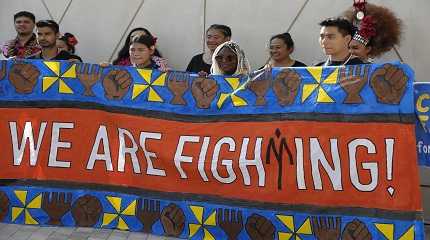
DUBAI, United Arab Emirates (AP) — The United Nations climate conference on Friday began its final week with negotiators expected to zoom in on the future of fossil fuels on a dangerously warming planet.
Reopening COP28 after a rest day, President Sultan al-Jaber described what he saw as an “unprecedented level of momentum” for the summit.
The climate summit is “sending a clear signal that all of us — small and large – can make a difference,” al-Jaber said. “Let us build on that success for an unprecedented outcome.”
He added: “I need you to step up and I need you to come out of your comfort zones.”
Al-Jaber did not elaborate, but the discussions after a first week of pageantry and official visits now become more difficult, particularly when it comes to language calling for the potential phase-out of the use of emission-spewing fossil fuels. Any language along those lines likely will draw the ire of Saudi Arabia, a major oil producer just next door to the United Arab Emirates. The UAE itself also is planning to boost its oil production from 4 million to 5 million barrels of crude oil a day to take advantage of the fossil fuel market before countries potentially shift away from its use.
U.N. Climate Change Executive Secretary Simon Stiell again underlined the challenge ahead if the world doesn’t limit emissions, describing ice shelves melting causing catastrophic flooding in coastal cities around the globe.
“If we pass these key thresholds, we can never go back from the planet’s perspective,” he said. A report released Wednesday on the sidelines of the summit warned that melting of ice sheets could reach the point of no return with more warming.
The Emiratis continue to insist the COP28 summit will end on time. Earlier Friday morning, COP28 Director-General Majid al-Suwaidi insisted al-Jaber soon would lay out a plan to ensure the summit would be brought to “a successful close by 11 a.m. on the morning of Dec. 12.”
That drew a few surprised looks among journalists at the news conference. Conference of Parties summits on the climate notoriously run days over time. However, Dubai Expo City, the site of the summit, already has started to advertise that it will hold Christmas events for the general public by Dec. 15.
Al-Jaber outlined a plan to have some senior officials to “conduct negotiations on my behalf” in the days ahead to speed up the summit.
Negotiators this week are working to finalize a key document called the Global Stocktake. It evaluates the world’s climate change progress since the 2015 Paris agreement and what needs to be done now to avoid blowing past its goal of limiting warming to 1.5 degrees Celsius (2.7 Fahrenheit) compared to preindustrial times.
A draft of the Global Stocktake was already circulating before Thursday’s rest day, although it was packed full of so many possibilities that it’s far from clear what the final document will say. Now it’s up to officials to haggle over what the future should look like and whether there should be a commitment to phase out oil, coal and natural gas — as climate activists, many experts and some nations say — or something softer.
Professional negotiators who have been working on getting options into shape will turn over their work to senior national officials, many at minister levels, who will have to make the tough political choices.
Stiell criticized the current text before delegates as “a mixture of posturing and lowest common denominator positions.”
“Yes, you must make compromises, but not on 1.5 degrees,” he said.
EU countries, along with small island countries — oft-victimized by climate change — and some progressive Latin American countries are aligned on calling for a phase-out of fossil fuels, negotiators said. While there will be strong resistance to this measure, officials are confident references to fossil fuels will appear in the final text for the first time and within a timeline compatible with U.N. science reports.
Representatives for poor nations and climate advocates are putting a lot of pressure on negotiators for the fossil fuel sections.
“The success of COP28 will not depend on speeches from big stages,” said Uganda climate activist Vanessa Nakate. “It will depend on leaders calling for a just and equitable phase-out of all fossil fuels without exceptions and distractions.”
Meanwhile, headway was made Thursday on deciding the conference hosts for next year’s COP29 after Azerbaijan and Armenia released a joint statement agreeing to work toward a peace treaty. It said that Armenia supports Azerbaijan’s bid to host the talks by withdrawing its own candidacy.
Countries had been unable to agree on an eastern European host for next year’s climate summit with Russia vetoing European Union countries and Azerbaijan and Armenia refusing each other’s bids. A decision on the meeting’s location and presidency is due within the next week.
Away from negotiations, Friday’s theme at the climate conference was youth day, with organizers calling it vital for young people to take part in climate activism because they’ll be most affected by the decisions at COP28. Activists are expected to ramp up calls for stronger action Friday and into the weekend.
Notably absent will be climate activist Greta Thunberg, who is skipping the conference. Thunberg, who does not fly because of the carbon pollution it emits, criticized its location earlier this year in a major oil-producing country.




